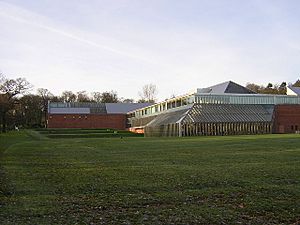Brit Andresen facts for kids
Quick facts for kids
Brit Andresen
|
|
|---|---|
| Born | 1945 |
| Nationality | Australian |
| Occupation | Architect |
| Children | Anna O'Gorman, Emily O'Gorman |
| Awards | RAIA Gold Medal (2002) |
| Practice | Andresen O'Gorman Architects |
| Buildings | Burrell Museum (1972), Rosebery House (1998), Moreton Bay Houses (2001) |
Brit Andresen (born in 1945) is a famous Australian architect who was born in Norway. She is known for her incredible work designing buildings, teaching architecture, and studying its history. In 2002, she made history by becoming the first woman ever to win the RAIA Gold Medal, Australia's top award for architects.
Contents
A Life in Architecture
Brit Andresen was born in Trondheim, Norway. During her childhood, she moved between Norway and Australia because her father, an engineer, worked on large hydroelectric (water power) projects in Australia. This early travel gave her a unique view of the world.
She decided to study architecture in Norway and graduated in 1969. A couple of years later, in 1971, she moved to Cambridge, England. There, she started her own architecture company and also began teaching at the famous Cambridge University.
The Burrell Museum Competition
In 1972, Andresen and her partners won a major competition to design the Burrell Museum in Glasgow, Scotland. This was a huge achievement for a young architect. However, there wasn't enough money to build it right away.
By the time the project was finished and opened in 1983, the original design team had split up. The final building was completed by one of her former partners.
Moving to Australia and a New Partnership
In 1977, Andresen moved to Australia for a teaching job at the University of Queensland. She was the first woman ever hired to teach in the university's architecture department.
At the university, she met another teacher named Peter O'Gorman. They got married in 1980 and started their own architecture firm, called Andresen O'Gorman Architects. Their company became known for designing beautiful houses that used Australian hardwood timber. Their designs focused on connecting the inside of a building with the nature outside, creating spaces where people felt close to their environment.
A World-Class Teacher
Besides teaching in Cambridge and Queensland, Andresen has taught at many other top schools around the world. These include the Architectural Association in London and UCLA in the United States.
She retired from full-time teaching in 2010 after 33 years at the University of Queensland. Because of her amazing contributions, she was given the special title of Emeritus Professor. She continues to share her knowledge by teaching special classes for expert architects.
Famous Buildings
Here are some of the well-known projects Brit Andresen has worked on:
- 1972: Burrell Museum (Scotland)
- 1994: Ocean View Farmhouse (Queensland)
- 1998: Mooloomba House (Queensland)
- 1998: Rosebery House (Queensland)
- 2001: Fernberg Pavilion (Queensland)
- 2001: Moreton Bay Houses (Queensland)
Major Awards
Andresen has received many awards for her work in architecture and teaching.
- 1970: Dutch-Norwegian Research Scholarship
- 1990: Teaching Excellence Award from The University of Queensland
- 2002: Fellow of the Royal Australian Institute of Architects
- 2002: RAIA Gold Medal
See also
 In Spanish: Brit Andresen para niños
In Spanish: Brit Andresen para niños
 | May Edward Chinn |
 | Rebecca Cole |
 | Alexa Canady |
 | Dorothy Lavinia Brown |


